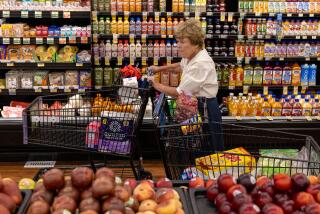Christmas’ miracle workers
- Share via
Just the other day, as I was about to order an obscure book from Amazon.com, I paused mid-click. I decided to refrain from pulling one more book out of Amazon’s warehouse and adding one more box to the already taxed UPS worldwide shipping system. The book could wait until next year.
That pause would never have happened had I not worked at UPS, and four large retailers, over the last few years. But now I know: Every little bit helps when it comes to keeping boxes off the road in December.
We’re a nation of last-minute shoppers, and most of us, caught up in the frenzy of Christmas retailing, see just one side of the equation: long lines, disorganized merchandise and slow service. Several holiday seasons back, I decided to go to the other side, to join the ranks of the workers who allow large retailers to sell as much as they do during this final push of the quarter.
My first stop was UPS, as a driver’s assistant, the extra holiday delivery helper in the truck. Delivering packages to the residents of San Francisco, I got a close-up view of the annual UPS push to the finish line that is Dec. 24.
I started at 8 a.m. and ended long after dark. Most days, we’d be on and off the truck at least 200 times, drenched in rain if the weather was bad, soaked in sweat regardless. The goal was to have every package in our crammed truck find its way to a doorstep or inside a house by the end of the day.
At Christmas, so many packages flow through UPS that the regular routes are divvied up among more drivers; the usual route’s packages won’t fit in one truck. If we were lucky, another driver would finish his load first and help us out with what was left in our truck.
On Wednesday, UPS delivered more than 22 million packages on what was expected to be the company’s peak 2007 shipping day, which means that UPS workers moved 250 packages each second of that day. The regular flow is 15 million packages each workday. These numbers define the UPS machine, but they just begin to hint at the human toil of people running from truck to doorway and back again.
As I worked the rest of the year through the U.S. retail sector, a writer serving undercover on the front lines of commerce at places like Starbucks, the Apple store and Gap, my goal was to see how companies turned regular workers into believers. As a consumer, you can guess some of what I discovered: The more cohesive a company’s culture, the better the product and the service. But even the best get swamped and stressed at Christmas.
This weekend, take a look at the changing rooms at a Gap store. You’ll see what looks like an avalanche of sweater vests in the bright primary colors of the season. You can walk away, but there’s a crew of workers -- at Gap, staff numbers generally double at Christmas -- who will stay long past closing time to fold and stack.
And when you have to wait an extra 45 seconds this weekend for a Starbucks triple tall decaf vanilla latte, try to appreciate the work-flow efficiency that the coffee seller has mastered, and consider that Starbucks will note the volume it sees reflected in its “point of sales” receipts and try to turn that data into better barista service next time. The thing to focus on as you shop is not how bad the service is, but how much is actually getting done each minute by people, not robots.
I’m not suggesting that you boycott this week’s crazed shopping. Go ahead, get in line. I’ll be there too. But I’ll also be keeping an eye on what’s going on behind the counter, and I’ll try to help myself when I can. If I need a cup of coffee, I’ll brew it at home. And instead of cursing slow service, I’m going to be as nice as I can to any worker I happen to find standing behind a cash register ringing up sales or putting a box on my doorstep.
More to Read
Sign up for The Wild
We’ll help you find the best places to hike, bike and run, as well as the perfect silent spots for meditation and yoga.
You may occasionally receive promotional content from the Los Angeles Times.






